
FROM


PROJECT BACKGROUND

REDUCING DEMAND FOR IVORY AMONG CHINESE TRAVELERS

PARTNERSHIPS
















FROM


PROJECT BACKGROUND

REDUCING DEMAND FOR IVORY AMONG CHINESE TRAVELERS

PARTNERSHIPS














After the Chinese domestic ivory ban in 2017, annual research on ivory consumption trends has shown a general decrease in intention to purchase ivory generally. However, research by WWF reveals that the intention to purchase ivory in the future among Chinese consumers has risen from 20% in 2022 to 29% in 2024, highlighting the need for sustained efforts to reduce demand. The rate of ivory purchases among Chinese consumers while traveling is estimated to have been 3.7% in 2024, significantly lower than the 6.8% in 2019 but slightly higher than the 3% in 2023. This slight increase in intentions to purchase from 2023 to 2024 highlights the potential influence
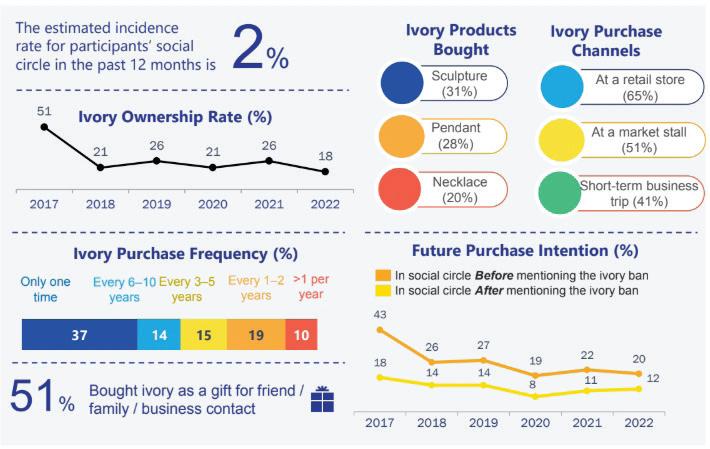

of a post-pandemic resurgence in outbound travel on the rate of ivory purchases, which cannot be overlooked.
In the research, regular overseas Chinese travellers were the only demographic which showed a sustained and even increased interest in purchasing ivory following the domestic ban, with Thailand being widely considered one of the best places to purchase ivory while abroad. Before the travel restrictions imposed to control the spread of COVID-19, over 10 million Chinese tourists were visiting Thailand every year. China and Thailand recently established a visa exemption policy, leading to an increase in the number of flights between the two countries. In 2024, Thailand received 35.32 million international tourists, of which Chinese tourists make up the highest percentage, accounting for 6.70 million arrivals.












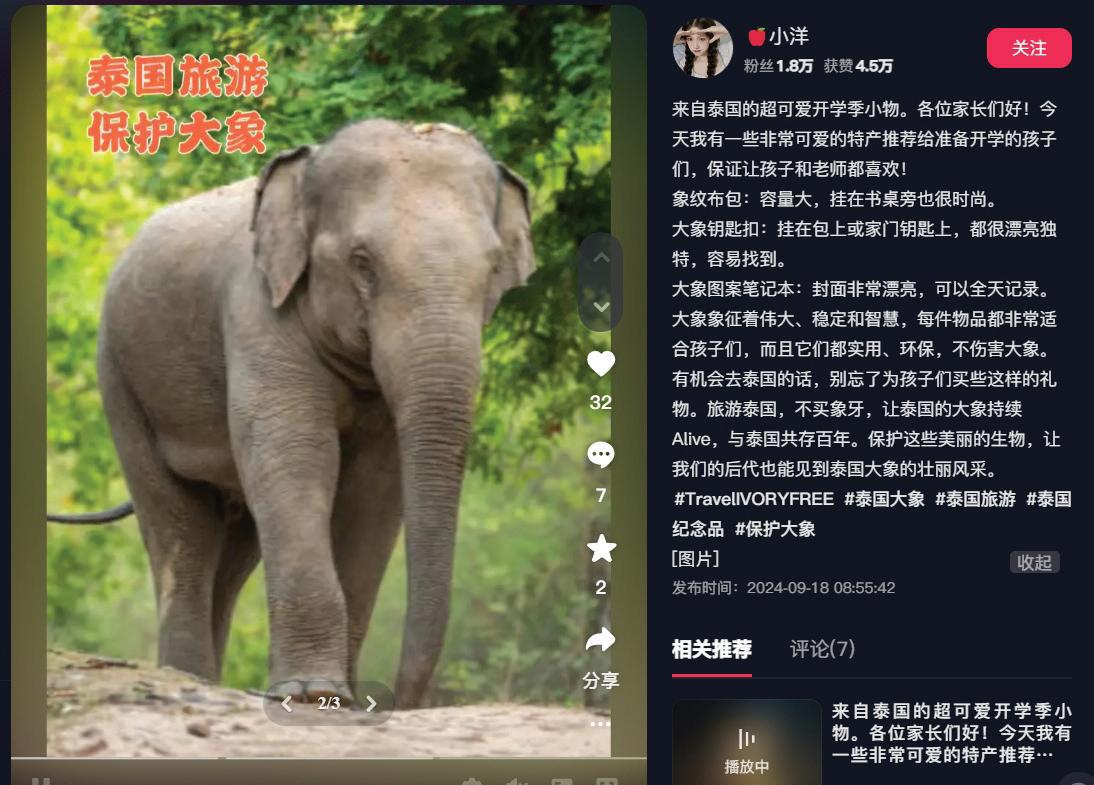

WWF-Thailand launched a Targeted Demand Reduction Campaign that successfully reached 7.2 million Chinese tourists while they were in Thailand. Overall, the campaign garnered attention from 70 million individuals. It engaged 88,000 people through online channels and 9,700 through offline activities in key tourism hotspots throughout Thailand.

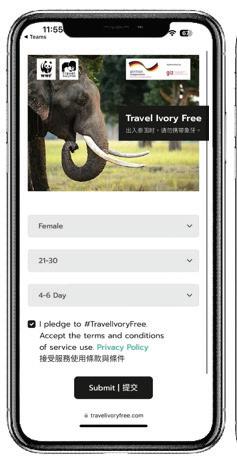
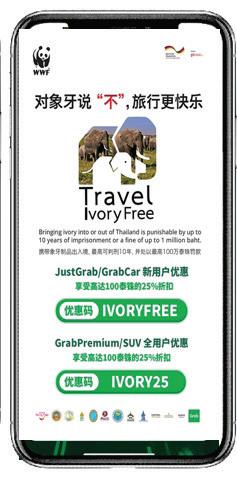










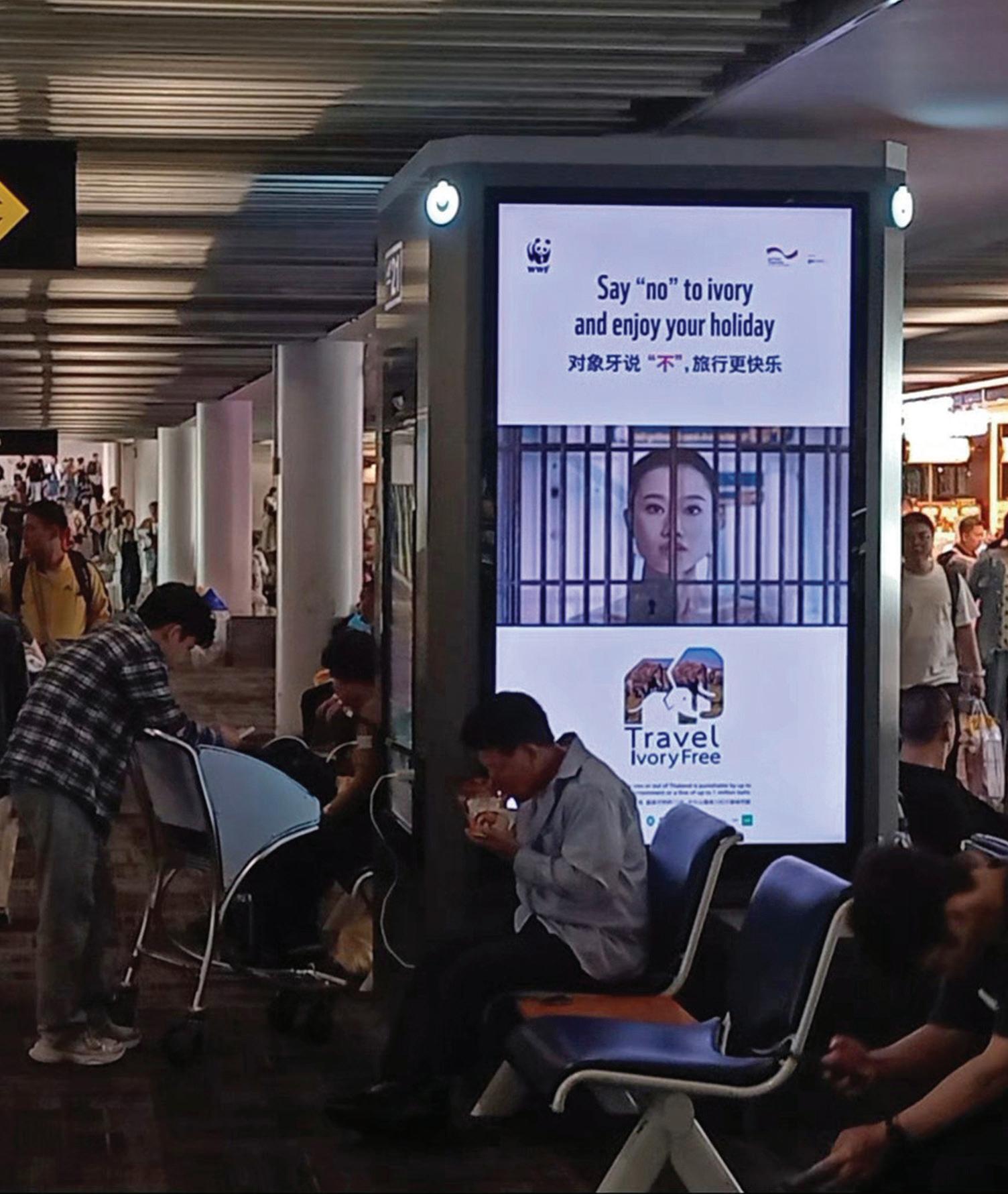









WWF-Thailand used both existing and new key visuals and messages for the campaign. The online strategy used innovative and precise social marketing, collaborating with digital marketing firms specializing in Chinese clientele. The focus was on Chinese travelers currently in Thailand and those interested in visiting the country. WWF identified three primary communication channels popular with Chinese tourists, along with Key Opinion Leaders (KOLs) among Chinese nationals living in Thailand. The materials were geotargeted to Chinese users while they were in Thailand, and were developed to continuously adapt to the evolving tourism landscape as visitors from China returned to Thailand. The tourism sector has been recovering steadily, and we have been closely monitoring shifts in traveler behavior following the return of visitors. For instance, the habits of Chinese travelers post-COVID have evolved from sending physical postcards to sharing personal experiences on social media platforms such as Douyin (Chinese TikTok) and Xiao Hong Shu (Chinese Instagram). In response, we adapted our strategy to focus on digital engagement rather than distributing physical postcards
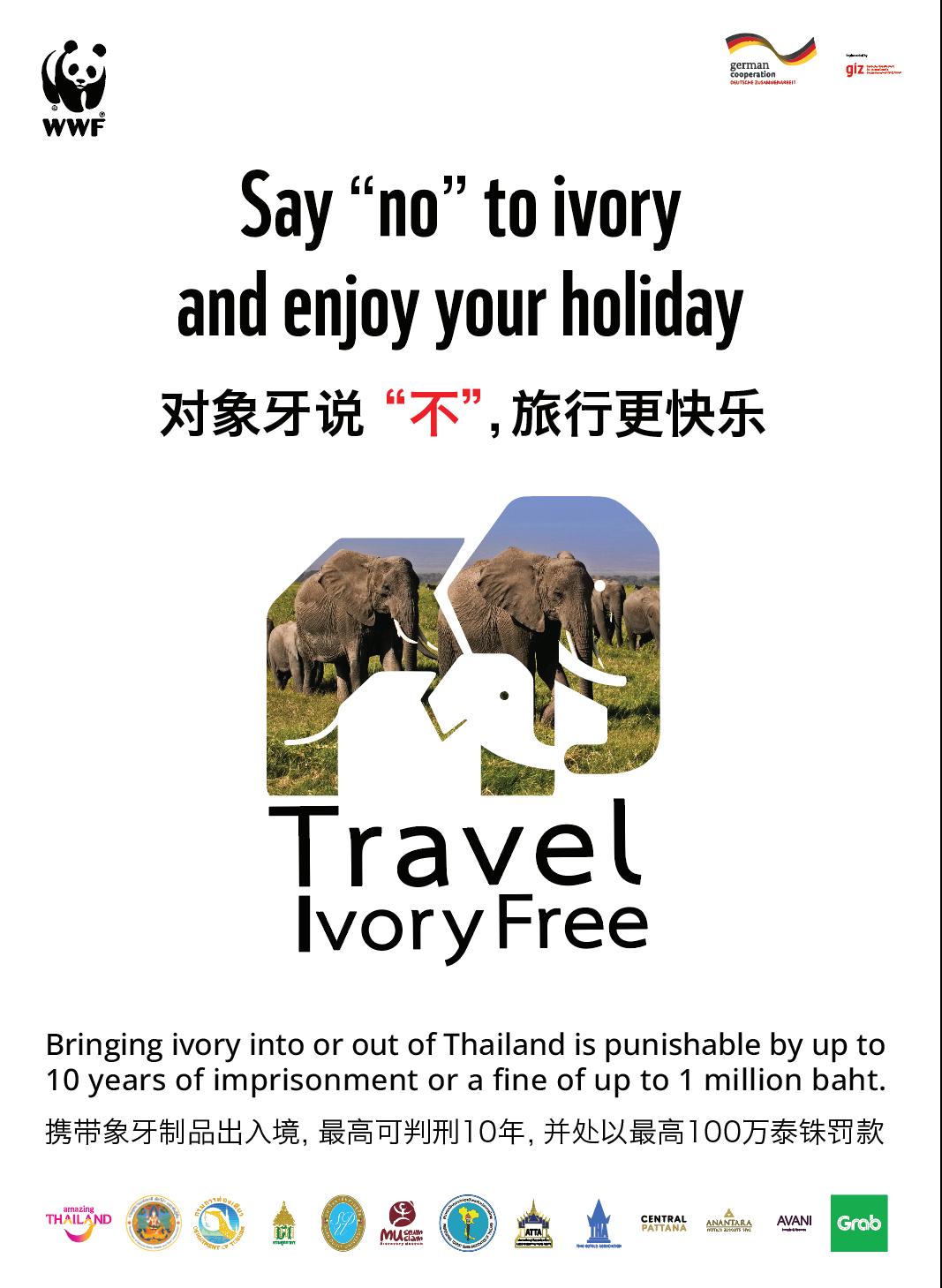
Strengthening partnerships with key stakeholders in the travel and tourism sector was also a key achievement. Our partners included the Tourism Authority of Thailand (TAT), the Department of Tourism (DoT), the Department of National Parks, Wildlife and Plant Conservation (DNP, which is the Thai CITES Management Authority), the Customs Department, Suan Dusit University’s School of Tourism and Hospitality Management, the Thai Hotel Association, the Association of Thai Travel Agents, the Professional Tourist Guide Association of
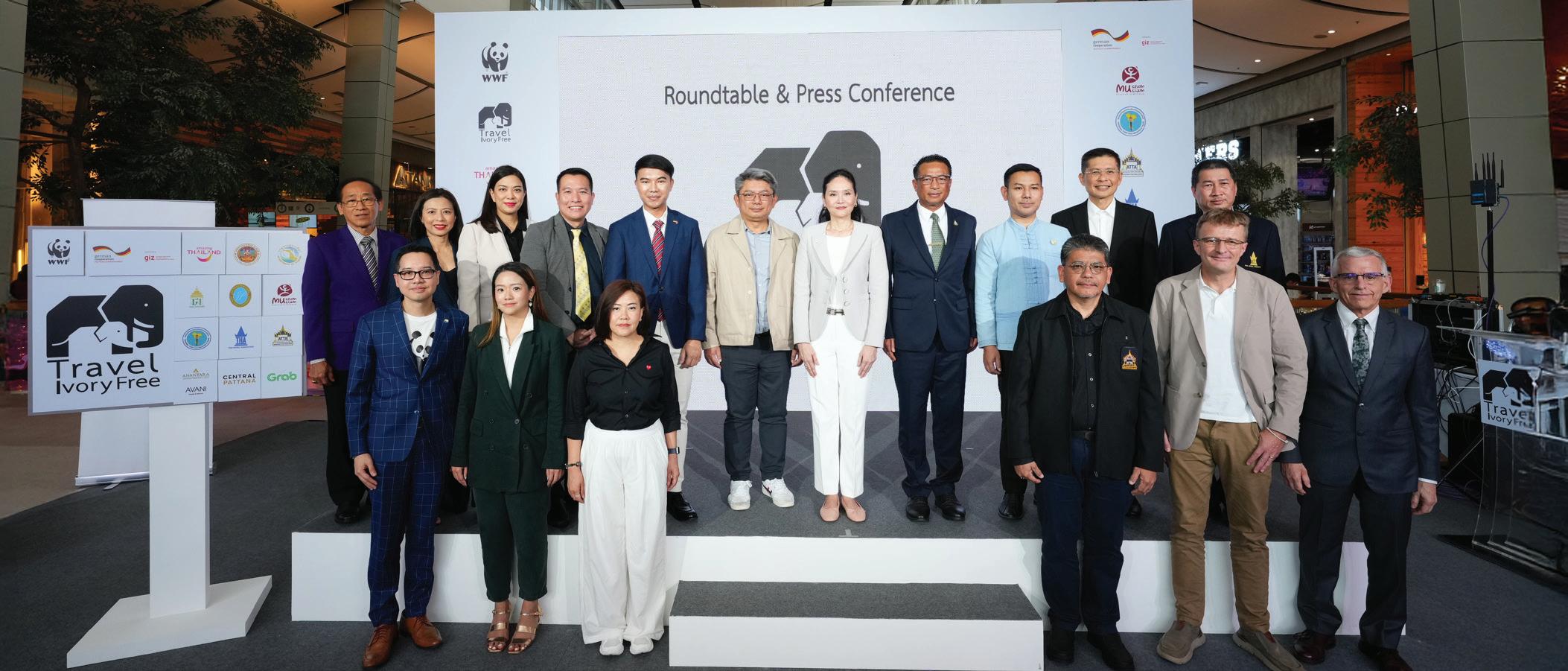
Thailand, Minor Group (Thailand’s largest hotel chain), GRAB, the Central Group (Thailand’s largest department store chain), and Museum Siam.
These stakeholders contributed to and supported offline activities across multiple sectors, engaging tourists throughout their visits to travel in a wildlife-friendly and sustainable way. Partners provided tangible benefits such as discounts or promotional items to travelers who engaged with the campaign and committed to not buying ivory. This initiative was launched during a roundtable discussion and press conference,
signaling the start of the second phase of the campaign. The event emphasized the tourism sector’s commitment to sustainable, wildlifefriendly practices and a zero-tolerance stance on engaging in the illegal wildlife trade (IWT). Participants signed a Joint Commitment to support ivory-free travel in Thailand, coinciding with the launch of the Thai-Chinese visa-free scheme. The event garnered significant media value, both online and offline, totaling approximately 7.16 million THB.
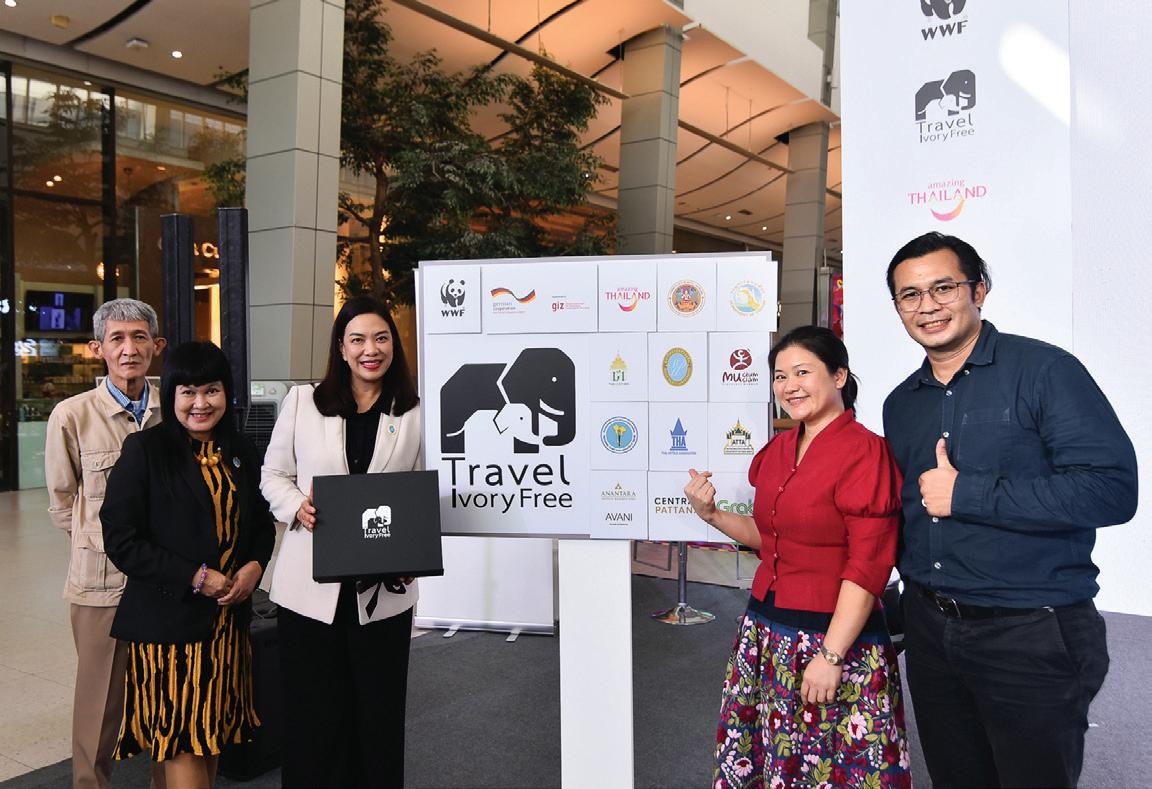

TAT has been a strong supporter since the campaign’s inception in 2018. Through our public relations efforts, we urge tourists to be a part of this awareness-raising initiative to help curtail demand for ivory products. Also, since 2020, we have been promoting the “Elephant Care Tourism” initiativq2e
to offer tourism that cares about Thai elephants

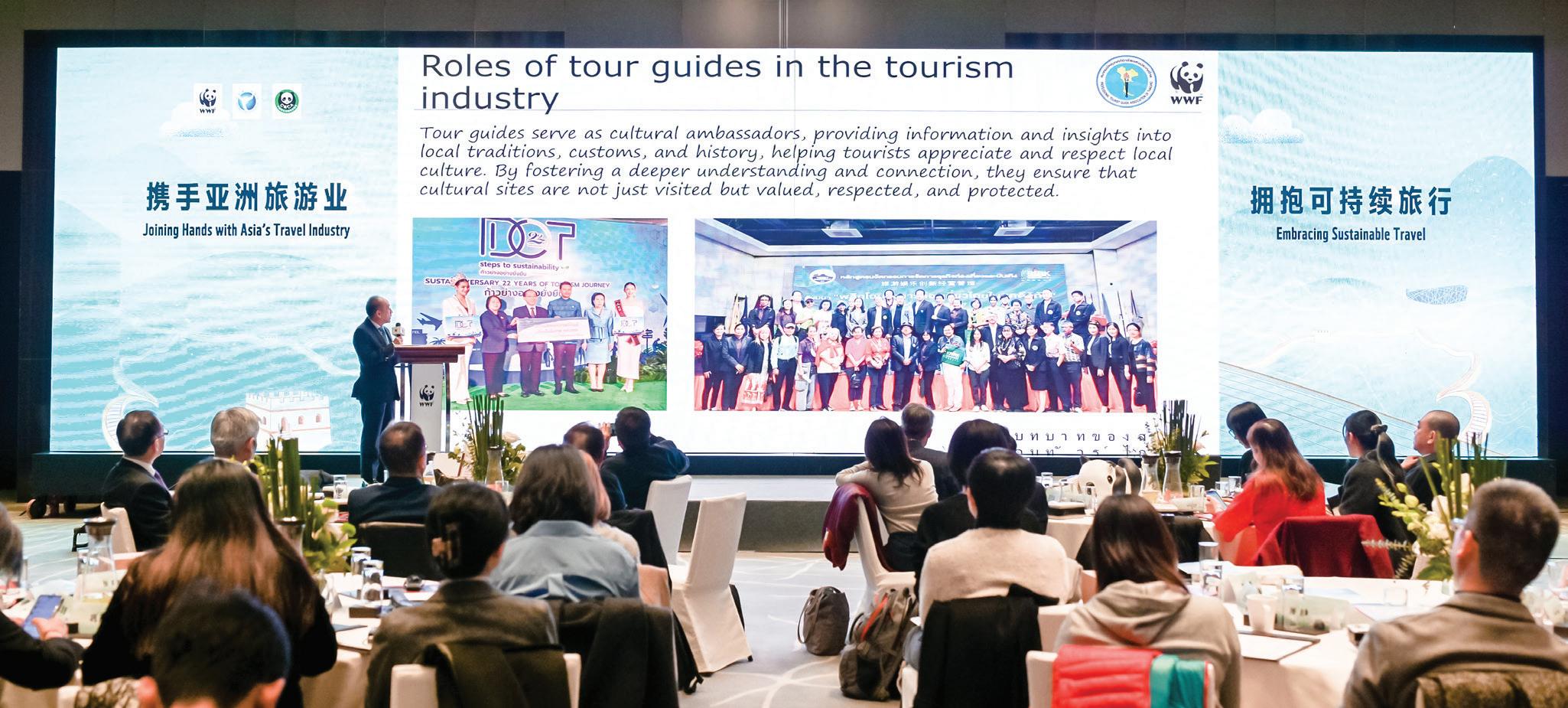
This event is evidence that China is giving importance to sustainable travel, and this is clear in global trends of travel. Tour guides are an important leader for this changing trend.
Mr. Wassapon Atthapornthanaseth President of the Thai Tourists Associations of Thailand
Notably, private partners expressed strong support for the campaign, and many invested their own funds to reduce demand for ivory. Grab, the most popular ride hailing platform in Thailand, contributed 6 Million Thai Baht to the initiative. Additionally, our partnership with Plan B generated 79,905,211 in media earnings through strategic placements of campaign materials in high-traffic areas frequented by Chinese travelers across Thailand. Targeted placement of ads reaching inbound passengers in key locations in and around Suvarnaphumbi airport, such as at the baggage carousel and along the main exit of the airport, also helped spread awareness raising and deterrent messaging to tourists entering Thailand.
Tour guides were essential campaign partners, since they have the ability to communicate directly with tourists. With an eye towards sustainability, WWF signed three year MOUs with Suan Dusit University’s (SDU’s) School of Tourism and Hospitality Management in November 2022, and the Professional Tourist Guides Association of Thailand (PGAT) in February 2023, to develop training modules on the role of tour guides in promoting sustainable travel and combating IWT. These modules were incorporated into SDU’s undergraduate courses, professional training programs and short courses for aspiring tour guides and tourism students. The PGAT has more than 1,600 members of which 600 cater specifically to Chinese tourists.















They have incorporated our training modules into their internal training procedures to ensure that their members have a basic understanding of conservation and IWT. Our partnership ensures that both active tour guides and new recruits to the profession receive valuable information on this topic.
Additionally, WWF commissioned research to better understand the motivations of tour guides, including existing incentives and deterrents for facilitating the sale of ivory. The key findings were incorporated in our tour guide training modules to better tailor it for this target audience.















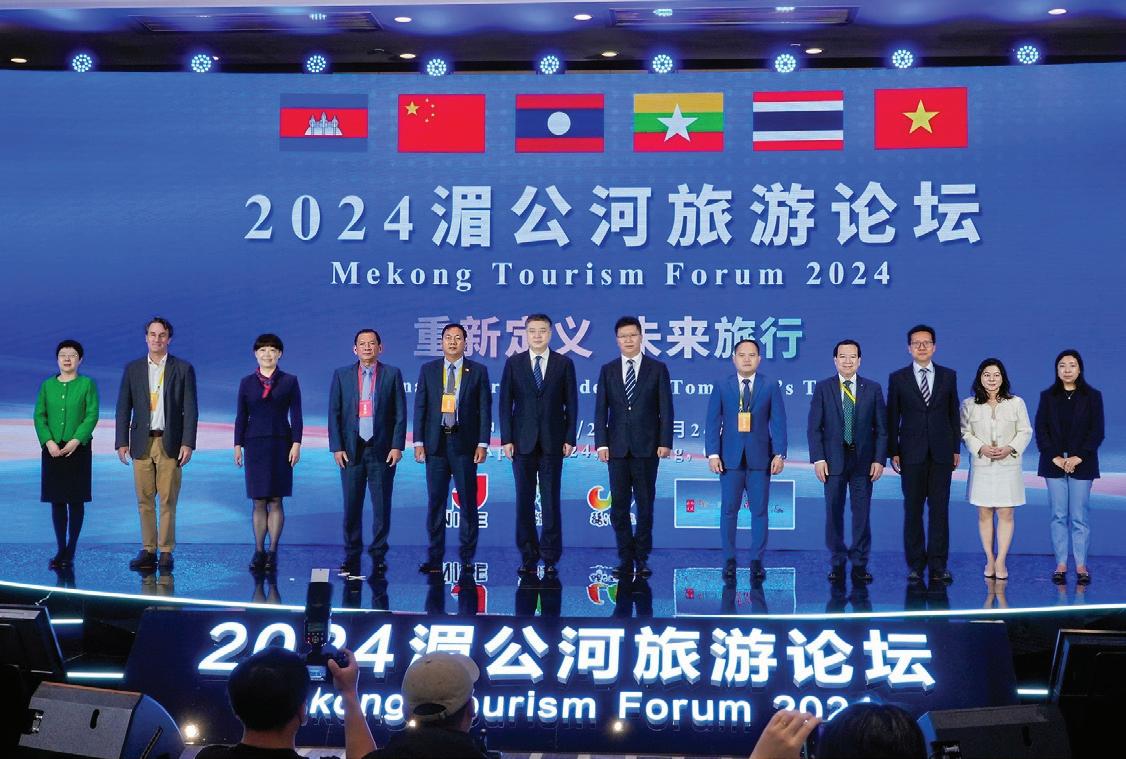

WWF-Thailand is also working closely with the DoT, the agency responsible for licensing tour guides and regulating tourism in Thailand. We proposed that the curriculum developed in collaboration with SDU be used to grant credits toward securing tour guide permits or renewal every five years, a proposal that the DoT has supported. This partnership will ensure the sustainability of the training materials we have developed, and the long-term continuation of our capacity-building efforts in the tourism sector.
To expand the campaign’s impact, WWF facilitated exchanges on sustainable tourism with our
partners and supported them in regional dialogues. We launched the Mekong ProtecTOUR campaign to cultivate a culture where tour guides protect not only their clients’ well-being but also wildlife and natural heritage. In total, four workshops were conducted with over 260 tour guides trained, who all pledged to be “Mekong ProtecTOURs,” dedicated to safeguarding their profession, their clients, and the reputation of Thailand as a travel destination, as well as wildlife and the environment. WWF participated in the Mekong Tourism Forum in 2023 in Sihanoukville, Cambodia, and in 2024 in Lijiang, China, to promote the Mekong ProtecTOUR and













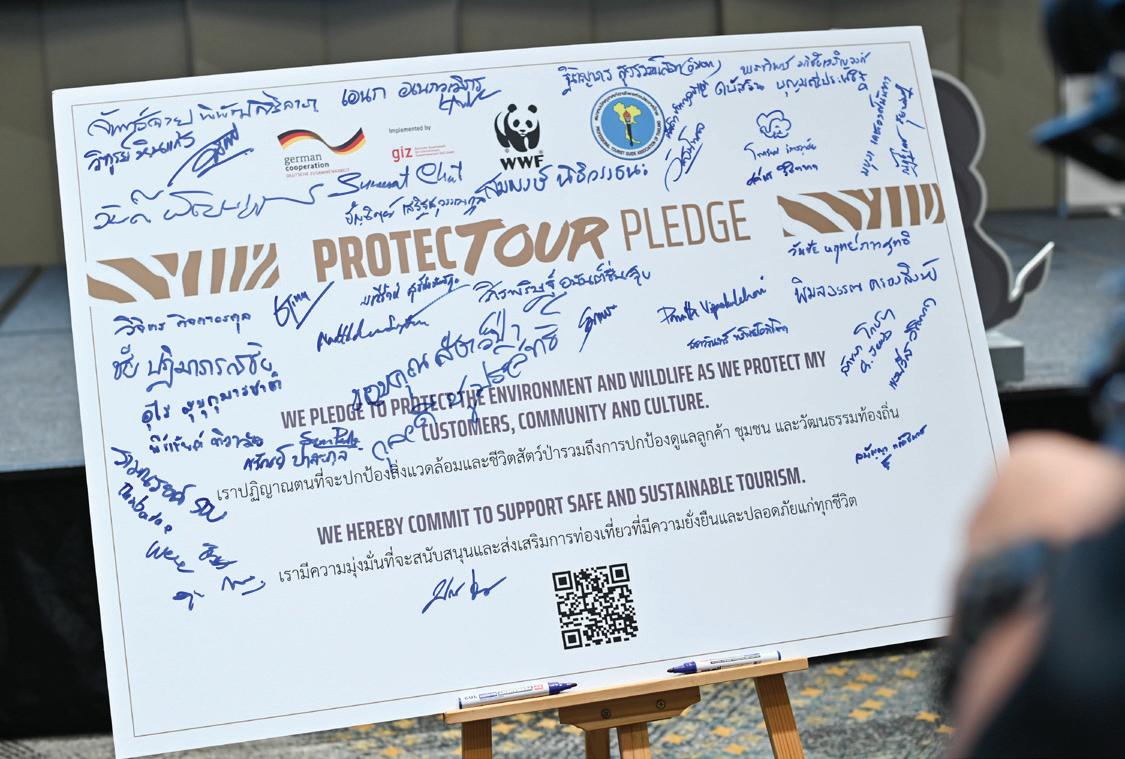

the ivory demand reduction work. Originally focused in Thailand, Viet Nam, and China, the Mekong ProtecTOUR project was expanded to include Cambodia through a grant from Foundation Philanthropia, building relationships with the Cambodian Ministry of Tourism and exploring further regional partnerships.
Furthermore, to strengthen Thailand-China relations, WWF and our partners participated in the 2023 World Tourism Alliance - Xianghu Dialogue, an international summit supported by China’s Ministry of Culture and Tourism in November 2023, and Joining Hands with Asia’s
Tourism Industry, Embracing Sustainable Travel in Beijing in November 2024. These events brought together stakeholders in the industry to share best practices for sustainable travel, with over 500 representatives from the global tourism community participating in panel discussions. WWF and its partners were able to ensure that wildlife and nature conservation were part of the sustainability discussion and shared our experiences from Thailand with relevant audiences.
The importance for cross collaboration between sectors is an opportunity to deliver the message of sustainable and responsible travel to wider audiences
















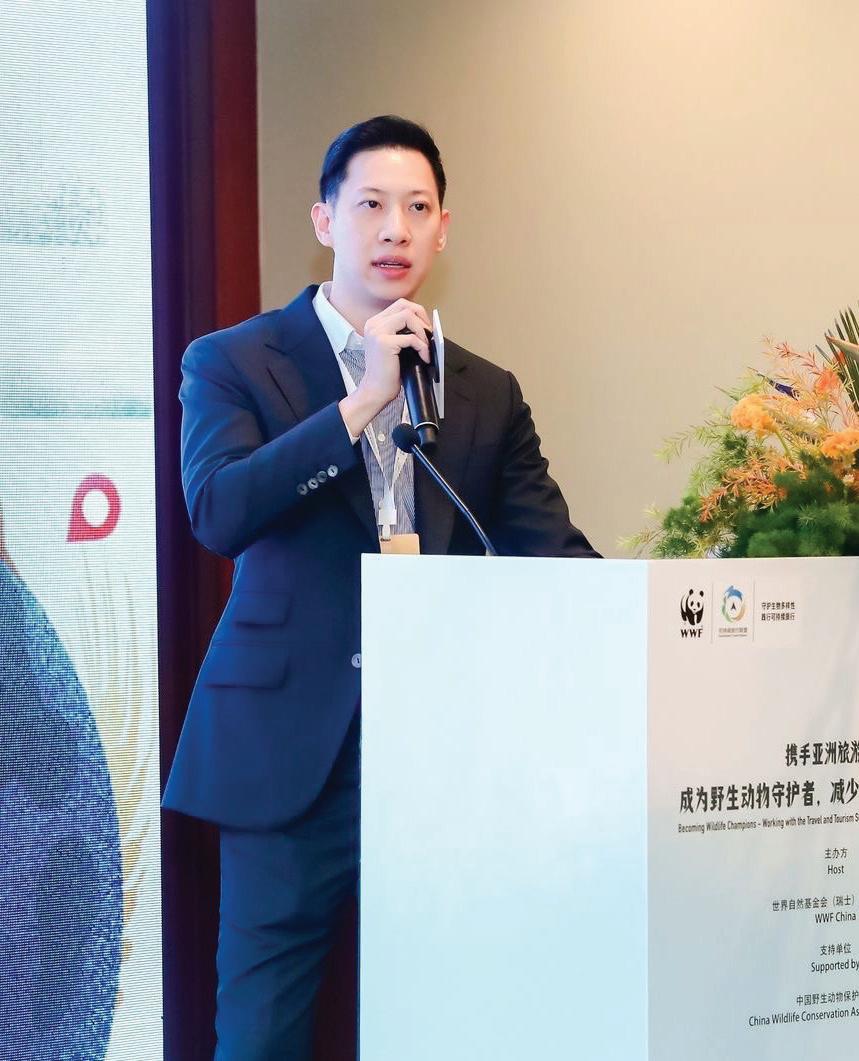
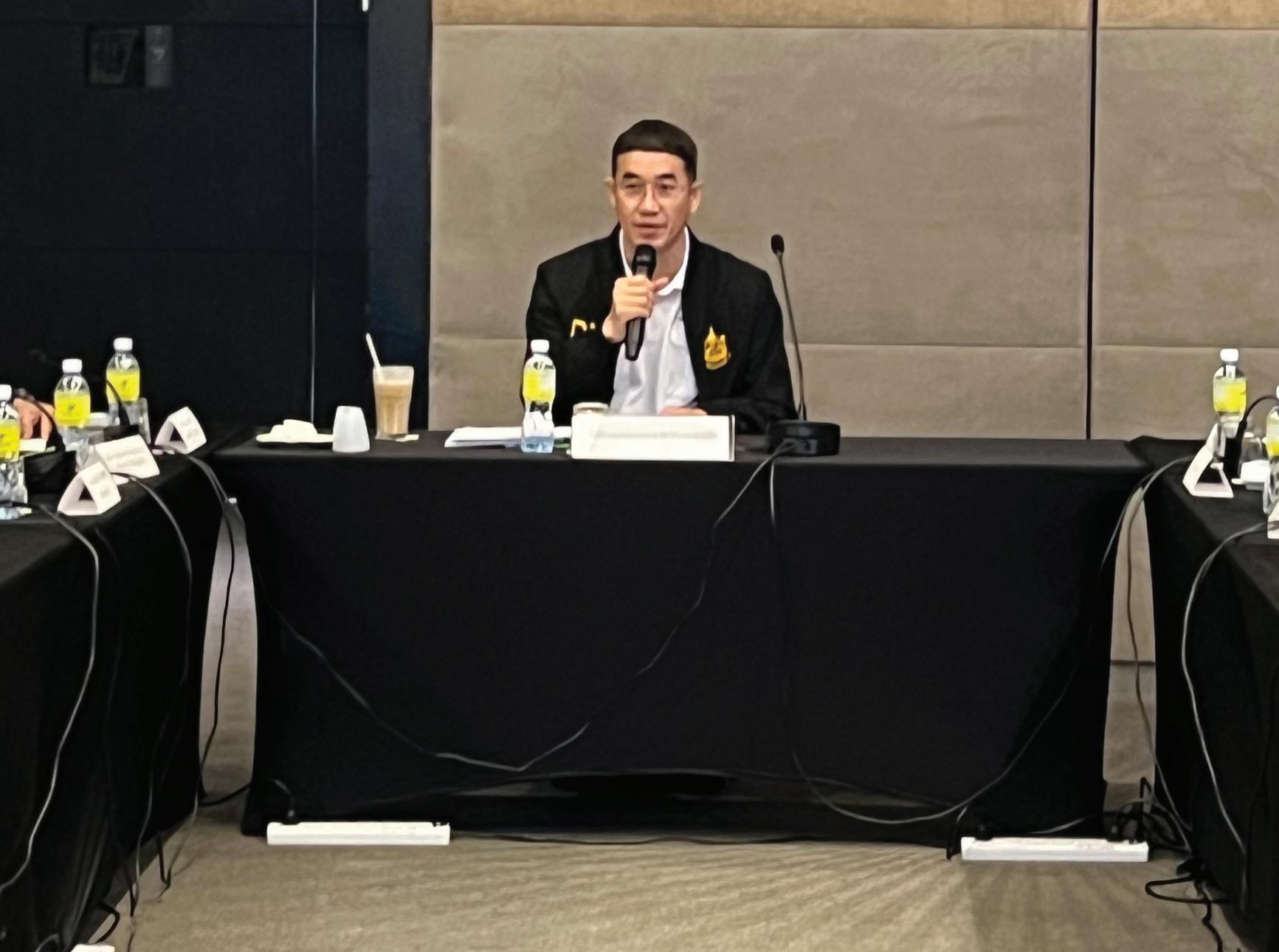
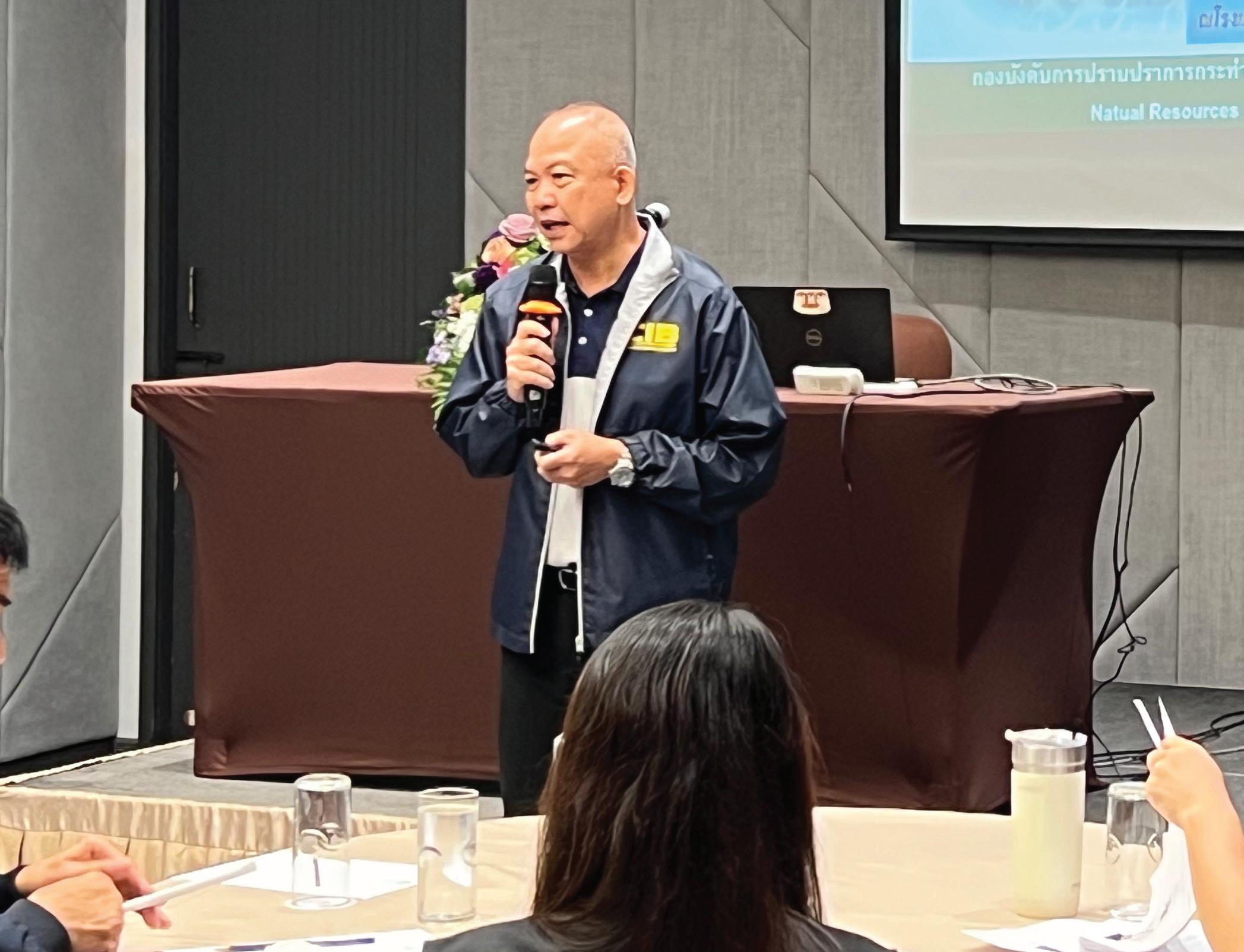
WWF successfully hosted three National Wildlife Enforcement Network (WEN) meetings and five provincial-level WEN meetings targeting law enforcement officers in key tourism hotspots.
The provincial WEN meetings were held at Suvarnabhumi and Don Muang airports in Bangkok, Chiang Mai and Hatyai international airports, and Laem Chabang port, with over 200 officers trained. These locations are strategic hubs in Thailand that have been hotspots for IWT in recent years. Wildlife traffickers exploit global aviation and maritime networks to carry out their illegal activities, which have caused significant environmental damage, endangered wildlife, and created risks to human health and security. The
aim of these meetings was to foster positive multi-agency cooperation and enhance the response to the recent surge in wildlife seizures, both in live animals and wildlife products.
After hosting a WEN meeting in November 2023 at Don Muang Airport, the airport authority participants deemed it necessary to implement 100% search protocols for all luggage and cargo passing through the airport as a
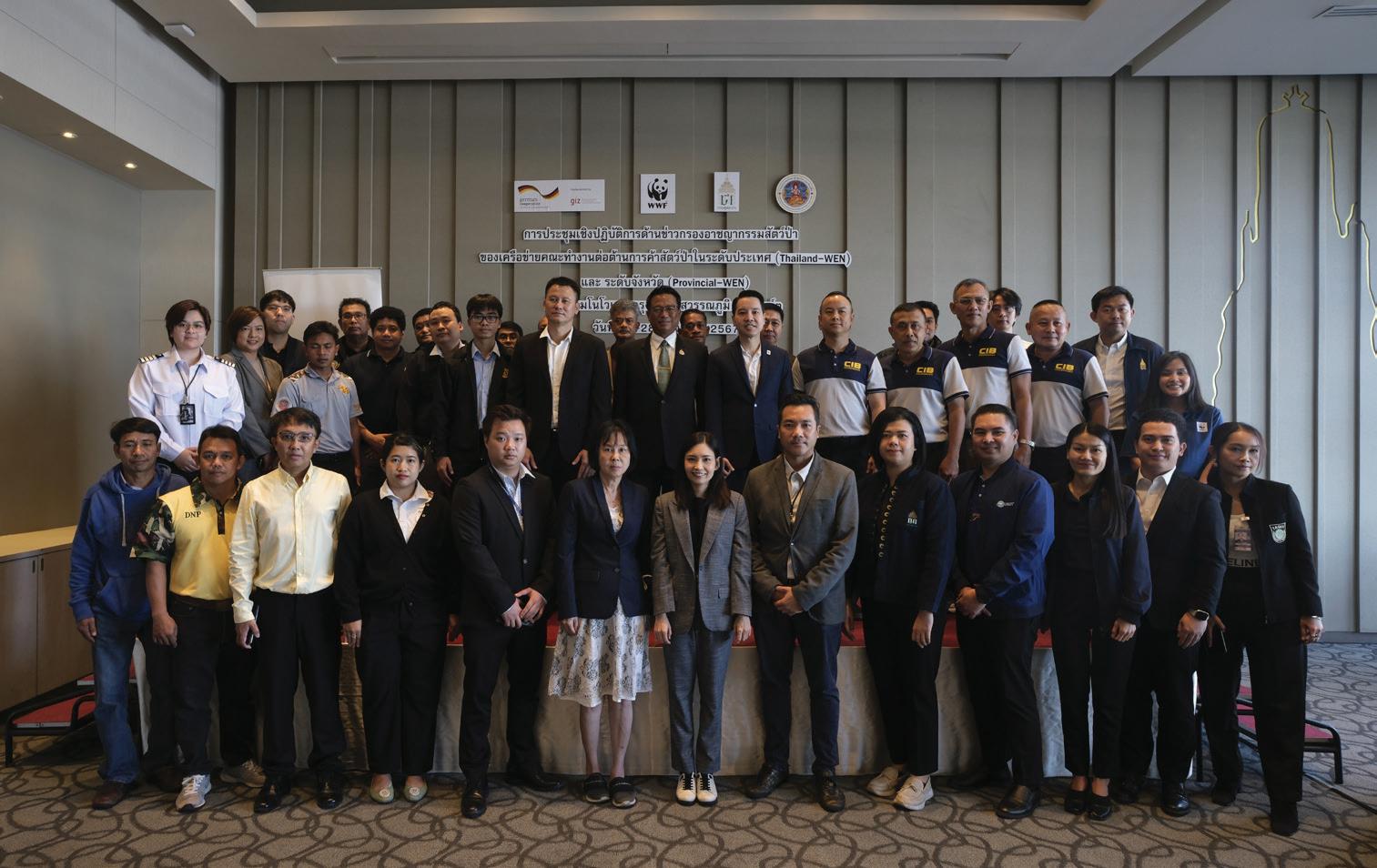

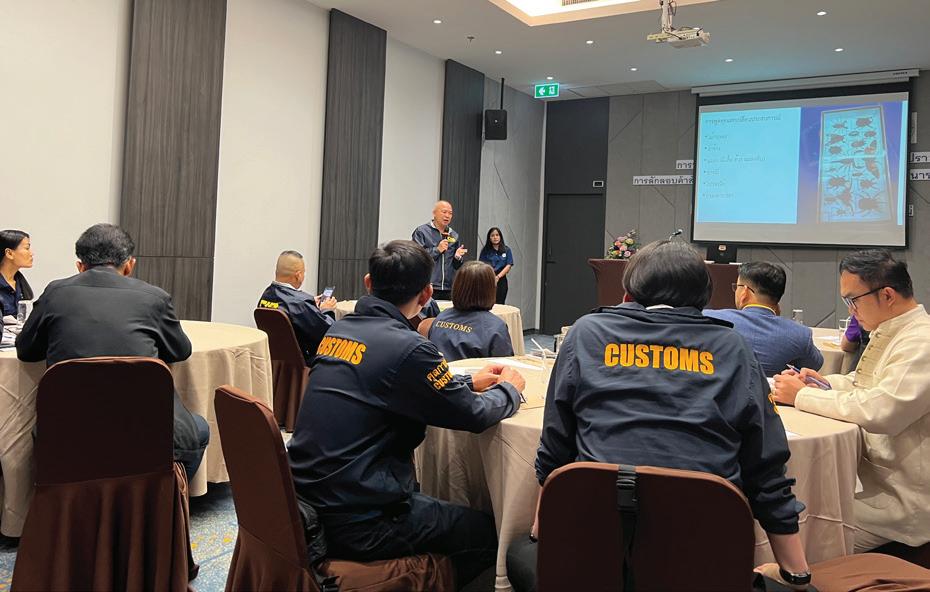

real-time response to the critical threat of IWT. This initiative led to a significant reduction in illegal wildlife cases at the airport and increased vigilance among officers. The officers who attended the meeting were also ivolved in the seizure of four kilograms of ivory being smuggled from Thailand to Indonesia in March 2024.
National WEN meetings were held, focusing on the national strategy in combatting wildlife crime, and involving 150 representatives from over 15 law enforcement agencies. Each meeting was tailored to include relevant private sector stakeholders, with participation from more than 20 private companies ranging from airlines to shipping lines, as well as representatives from key airport and seaport operators.
WWF-Thailand coordinated with our strategic partner, USAID’s Saving Threatened Wildlife project in Viet Nam, to support Hai Phong Customs officials to attend our national workshop, All Hands on Deck, targeting the International
As representatives of the Customs Department, whose primary mission is to inspect goods entering and leaving the Kingdom, we have developed procedures, tools, and personnel to enhance our ability to inspect illegal goods at the initial stage. However, for specialized goods, such as wildlife and plantrelated items, we collaborate with relevant agencies with specific expertise for further inspection. Although we have clear procedures in place for this, the capabilities of traffickers are also advancing. Therefore, training like this is beneficial to the Customs Department and is expected to be advantageous for everyone in strengthening knowledge, exchanging experiences, and fostering effective integrated collaboration.
Mr. PhantongLoykulnanta Principal Advisor on Duty Collection Management & Development



As representatives of the Department of National Parks, we are pleased with the cooperative efforts of law enforcement agencies in combatting wildlife cases. Cooperation between diverse authorities is expected to increase knowledge and understanding when working toward the same objective: to reduce the threat posed to wildlife by illegal wildlife smuggling, both in domestic or international trade,” said Mr. Narongrit Sookprakarn, Director of the Wildlife Inspection sub-division of Thailand’s Fauna and Flora Protection Division.


Maritime Organization in December 2022. Shortly after this workshop, the Hai Phong Customs officers who attended coordinated with the Anti-smuggling and Handling of Violations Division and the Municipal Police to inspect and seize a 20-foot container containing ivory smuggled from Africa. The ivory, estimated to weigh about seven tons, had been shipped from Angola and transited through Singapore to conceal its route. The container’s description used uncommon language and incorrect consignee information, which are common tactics used by smugglers to evade detection.
The ultimate goal in supporting the national-level agenda is to increase the profile of wildlife crime at the highest levels of government, and to strengthen the connection between the Provincial and National





WENs in order to improve intelligence and ensure wildlife crimes are investigated to the fullest extent of the law. WWF played a crucial role in supporting the DNP in pushing for the approval of its five-year strategy on IWT by the Thai cabinet. This strategy, championed by the National WEN, aims to involve and mandate several government departments to join hands in combating IWT and to elevate its status as a serious crime within national policy. To improve coordination, WWF facilitated an exchange of lessons learned from nationwide provincial WENs, which helped reinforce collective efforts to combat IWT and improve enforcement practices across Thailand.

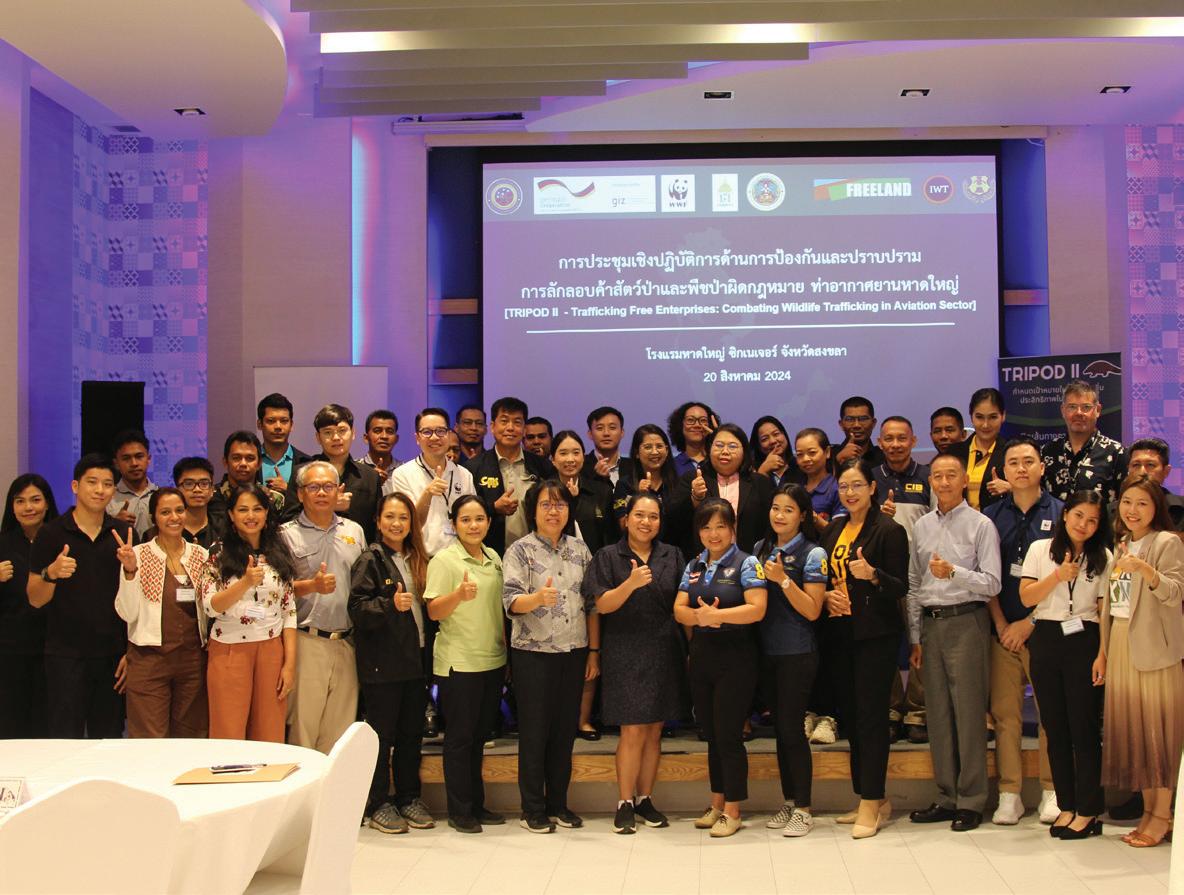

Governments must not only lead efforts on IWT but must also “network with local, national, regional or international initiatives” and that these must be “aimed at strengthening cooperation between the public and private sectors, encouraging them to share information and intelligence on wildlife trafficking as well as dissemination of best practices.”














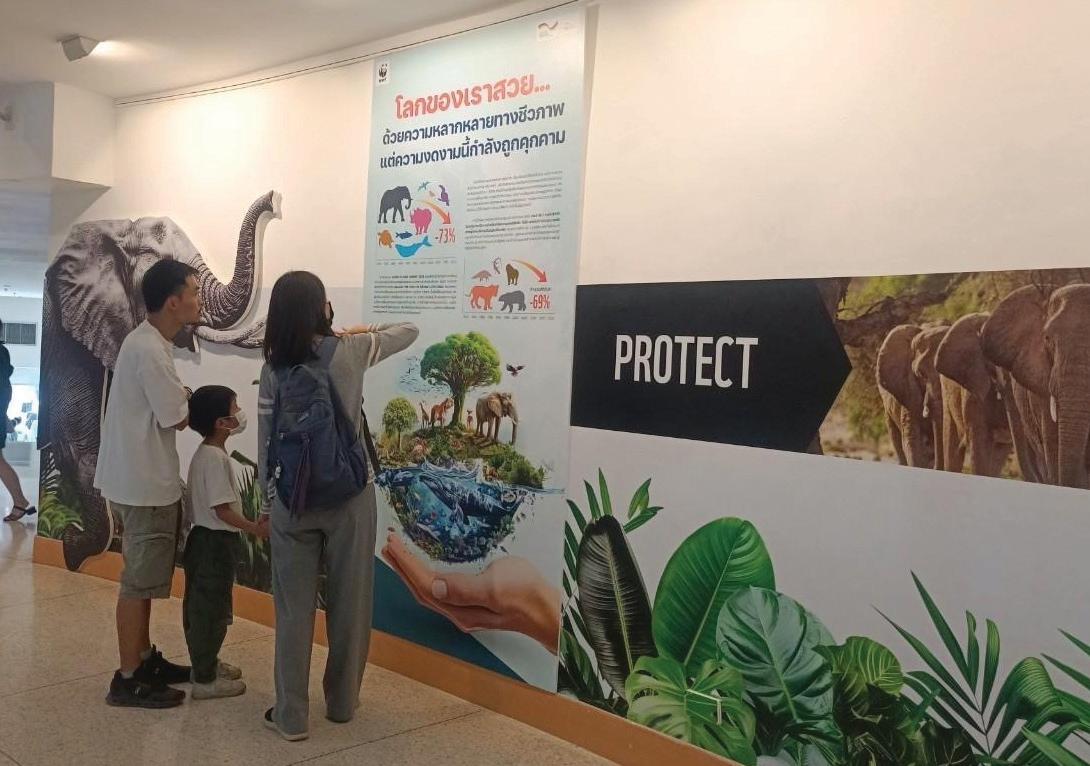
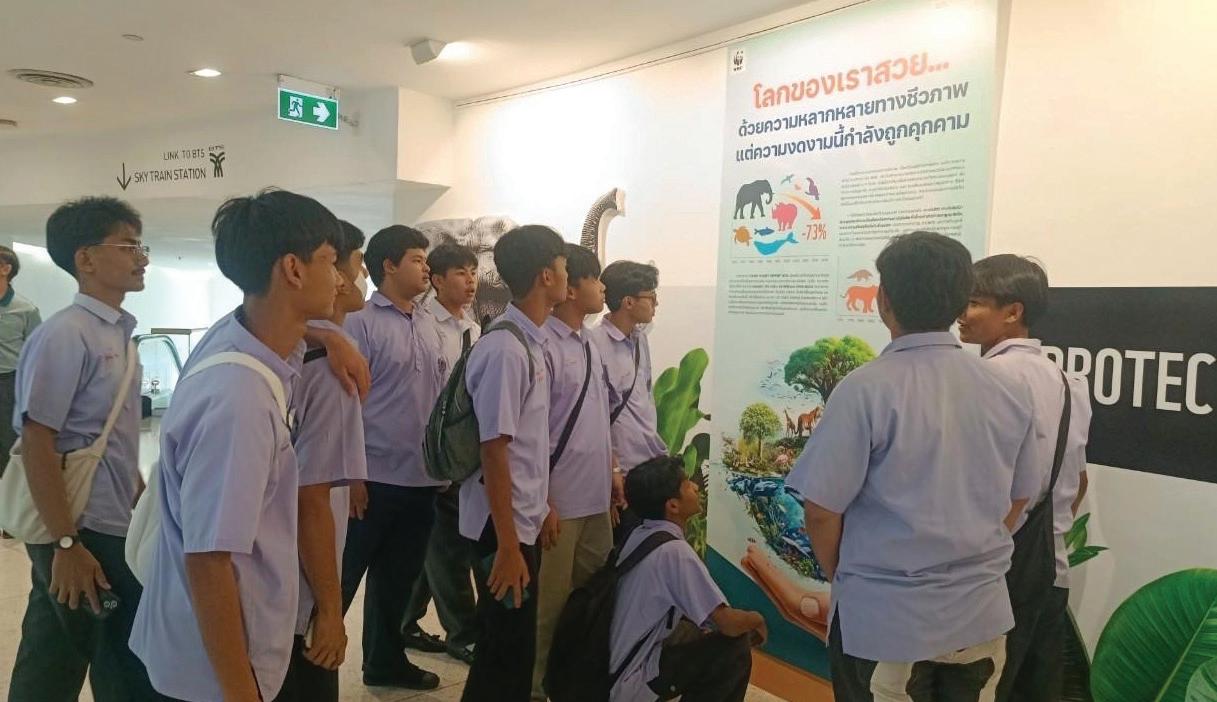
In collaboration with Thai PBS (the public broadcasting service in Thailand), WWF organized a final workshop and exhibition launch at the Bangkok Art and Culture Center, with participation from the law enforcement and travel and tourism sectors. The workshop facilitated insightful discussions about how both public and private sector partners had effectively contributed to combating wildlife crime, and secured their commitments to continue to work on the issue in the future. The exhibition, which ran for two weeks, aimed at the public, presented the need to tackle IWT, promote conservation efforts, and ensure environmental sustainability. The exhibition highlighted tigers and elephants, two iconic species often implicated in the wildlife trade. Through the exhibition, WWF was able to engage diverse audiences, including the Thai public and visitors to Bangkok during the Lunar New Year period.
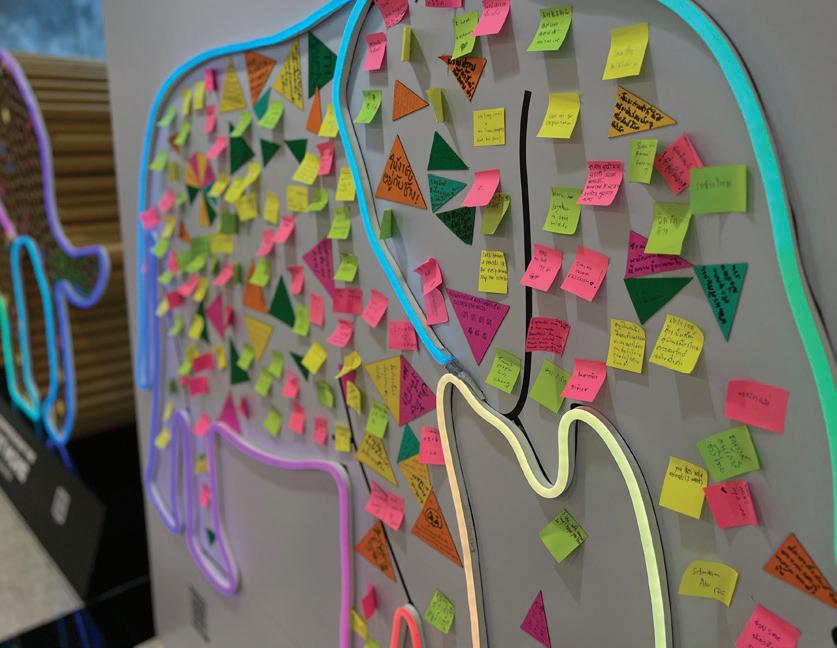












We are honoured to partner with WWF here in Bangkok, a global city in tourism. Through the Partnership Against Wildlife Crime in Africa and Asia, funded by the German Government, we reaffirm our strong commitment to combating illegal wildlife trade and protecting biodiversity. This collaboration highlights the importance of responsible tourism in preserving regional unique natural heritage, empowering communities, and ensuring a future where wildlife thrives alongside sustainable travel, “said Representative of GIZ.





WWF-Thailand collaborated with partners at CITES COP 19, where the CITES Management Authority participated in a project-funded side event in Panama. This event helped foster crossborder partnerships and localize sustainable travel initiatives.
As part of this project, WWF-Thailand and the DNP co-hosted a side event at the 8th IUCN Regional Conservation Forum in September 2024. The event, Innovative Approaches to Combat Illegal Wildlife Trade, showcased the role of Artificial Intelligence (AI) and machine learning in enhancing wildlife crime detection and suppression. It aimed to foster broader collaboration in conservation and address global development priorities. To further strengthen transboundary cooperation in combating IWT through sustainable travel initiatives, WWF-China invited representatives from the China Association of Travel Services (CATS)
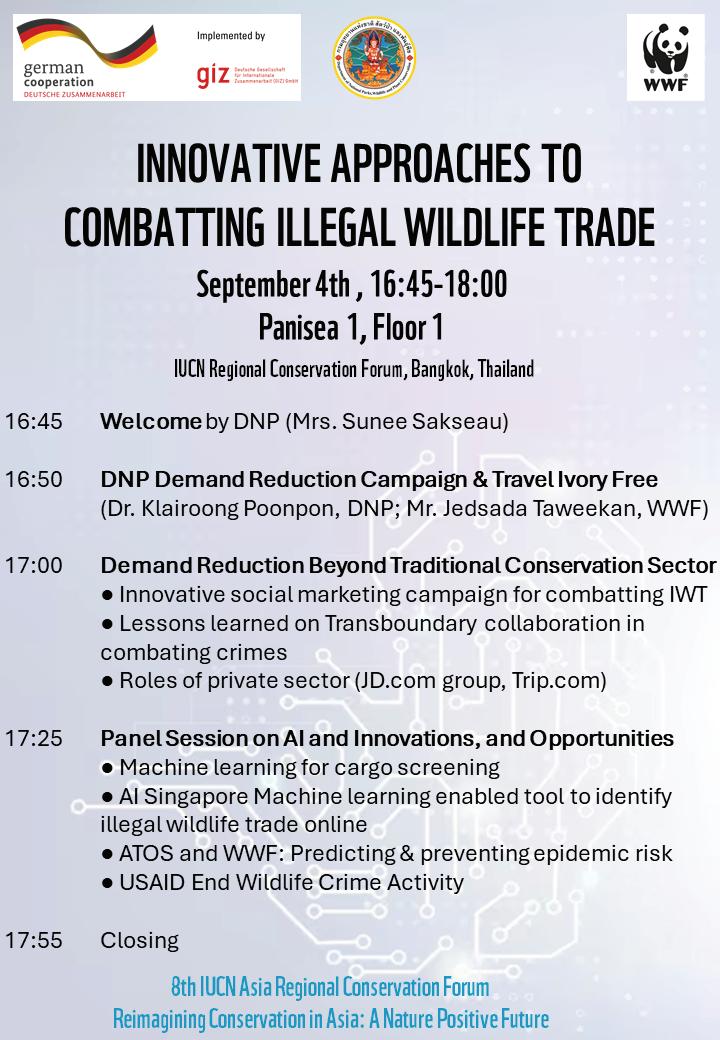








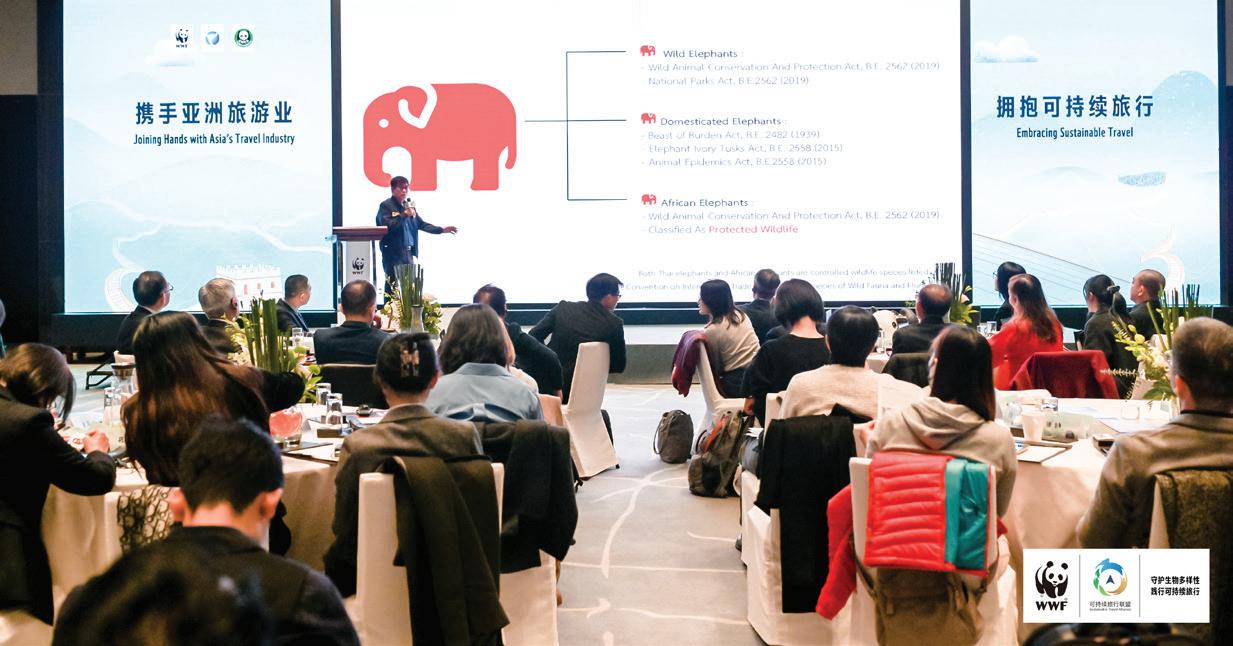
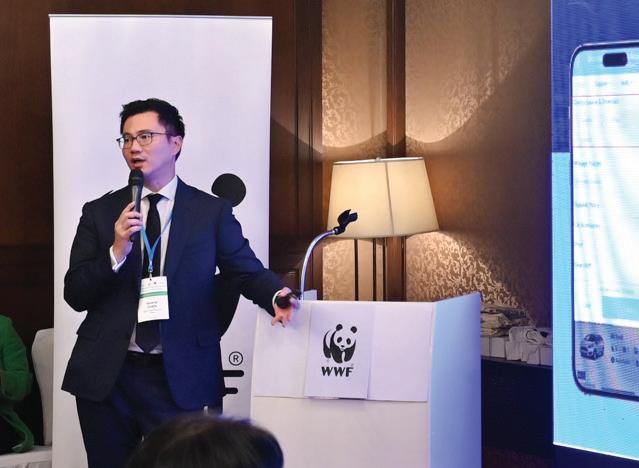
Trip.com Group recognizes the essential link between nature and people and launched ‘Sustainable Travel Alliance ‘together with WWF and other travel industry players in 2020. We strive to reduce our carbon footprint, focus on wildlife conservation, and offer global travellers more sustainable travel options.
Mr.Edison Chen Vice President of Trip.com Group











Everyone here today, whether directly or indirectly involved, plays an essential role in conservation. By sharing a common vision and working together, we can strengthen our efforts against wildlife trade. Today’s event underscores the importance of close cooperation and developing new, effective ways to combat illegal wildlife trade sustainably,
Mrs. Sunee Sakseau
Director of Division of Foreign Affairs, Department of National Park, Wildlife, and Plant Conservation
and leading tourism companies to attend the forum. Representatives from Viet Nam’s Ministry of Agriculture and Rural Development (MARD) also participated in the event.
The side event was attended by stakeholders from various sectors, including representatives from Guangxi Biodiversity Conservation, the Global Youth Development Forum, Green Tourism China, Cambodia’s Ministry of Education, IUCN, WildAid, Conservation Capital, the Corbetti Foundation, and the Association of Certified Anti-Money Laundering Specialists (ACAMS).
In November 2024, CITES Management Authorities from Thailand, China, and Viet Nam met in Beijing to share their experiences implementing CITES mechanisms in their respective countries, and to discuss how best to enhance regional cooperation in the fight against IWT. This meeting marked a significant milestone, as it demonstrated the parties’ commitment to future collaboration and their willingness to share best practices in combating wildlife trafficking.



OUR MISSION IS TO CONSERVE NATURE AND REDUCE THE MOST PRESSING THREATS TO THE DIVERSITY OF LIFE ON EARTH.